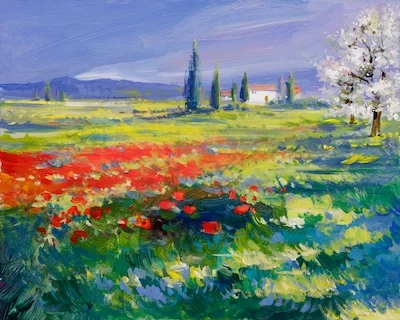DAVID THAUBERGER, opens March 10,2006, Nouveau Gallery, Regina
1 of 4

"Delivery Point"
David Thauberger, "Delivery Point," 2005, acrylic on panel, 12" x 24".
2 of 4

"David Thauberger"
David Thauberger at Nouveau Gallery, Regina, December 2005.
3 of 4

"Delivery Point"
David Thauberger, "Delivery Point," 2005, acrylic on panel, 12" x 24".
4 of 4

"Lands End"
David Thauberger, "Lands End," 2005, acrylic on canvas, 68" x 43".
DAVID THAUBERGER
Nouveau Gallery, Regina
Opens March 10,2006
By Jack Anderson
Saskatchewan painter David Thauberger returns again and again to the architecture of small-town Saskatchewan — service stations, general stores, Legion Halls, grain elevators and quirky hand-built homes.
With the eye of a home-grown prairie regionalist, Thauberger celebrates, memorializes and even eulogizes a way of life not quite past and forgotten, but perhaps soon to be. Unlike the drugstore postcards that his work often resembles (and is even sometimes sourced from), he resists buying into the monumental, the majestic or the mythic, foregrounding instead what might be considered banal and ordinary. By bringing into the gallery quotidian subject matters representing plain folk and an even plainer way of life, he turns our gaze to subjects usually relegated to a position outside the frame.
At the same time, working from what is essentially a pop art position and blurring the boundaries between high art and low art, Thauberger delights in challenging, critiquing and poking fun at gallery culture, at the grand sweeping narratives that paint a cozy picture of things. Indeed, he creates what he calls “genuine simulations” that play with visual artifice in order to get at cultural artifice.
Painting from his own photographs and his collection of postcards (he is a big collector of pop culture ephemera — of vernacular objects of low cultural status such as folk art), Thauberger’s work is without exception devoid of heroic flourishes or gestures.
Tidy to the point of clinical, even mechanistic, his ostensibly inert and impartial faux-documentary paintings (almost, if such a thing is possible, architectural portraits) point beyond the mere generics and typologies of architecture. Filled with a flat, deadpan matter-of-factness, his paintings slickly link visual flatness to a corresponding conceptual flatness (everything here, he seems to say, is a false façade propped up, supported and sustained by personal and cultural nostalgias).
Always casting his gaze to the surface of things, but wanting to expose the truth that lies immobile beneath it, Thauberger has frequently explored more ‘important’ sites, from Niagara Falls to the Rocky Mountains. Understanding that these majestic and iconic tourist terrains occupy a big chunk of space in the national imagination, he nonetheless sees them as clichés, treating them in his work less with reverence than with his trademark cool sass.
His upcoming exhibition at Nouveau Gallery in Regina continues his interrogation of these kinds of markers of Canadian history and identity. Thauberger not only re-examines small-town Saskatchewan (where he was born and raised) but he positions those prairie places against the quaint gothic picturesque of white lace curtains, rooftop cupolas and picket fence Victoriana that constitutes the gingerbread architecture of Prince Edward Island.
Collapsing distance and difference by pointing from lighthouse to grain elevator, this new body of work not only metaphorically links the rural culture and iconography of Saskatchewan to those of P.E.I., it identifies a shared historical and economic trajectory: one of boom and bust. Beyond indicating similar pasts (characterized by the cyclical collapse of their economies), Thauberger points indirectly to similar conditions shaping the present. Both places rely on one major economic engine to drive them forward (the oil and gas industry in Saskatchewan, and the Anne of Green Gables industry in P.E.I.). Both places suffer from rural out-migration and urban in-migration, and both fear the subsequent proliferation of multinational corporations.
Shifting gears from blithe to dead serious, Thauberger’s cool images are less the placid — even benign — landscapes of well-being than they are highly charged commentaries tracking and identifying disruption. Here false constructs, imagined and held in our collective memory, abound. Here place and history are not asserted, but rather contested.
Represented by: Equinox Gallery, Vancouver; Douglas Udell Gallery, Edmonton; Masters Gallery, Calgary; Nouveau Gallery, Regina.

Nouveau Gallery
2146 Albert St, Regina, Saskatchewan S4P 2T9
please enable javascript to view
Thurs to Sat noon - 4 pm, and by appointment
